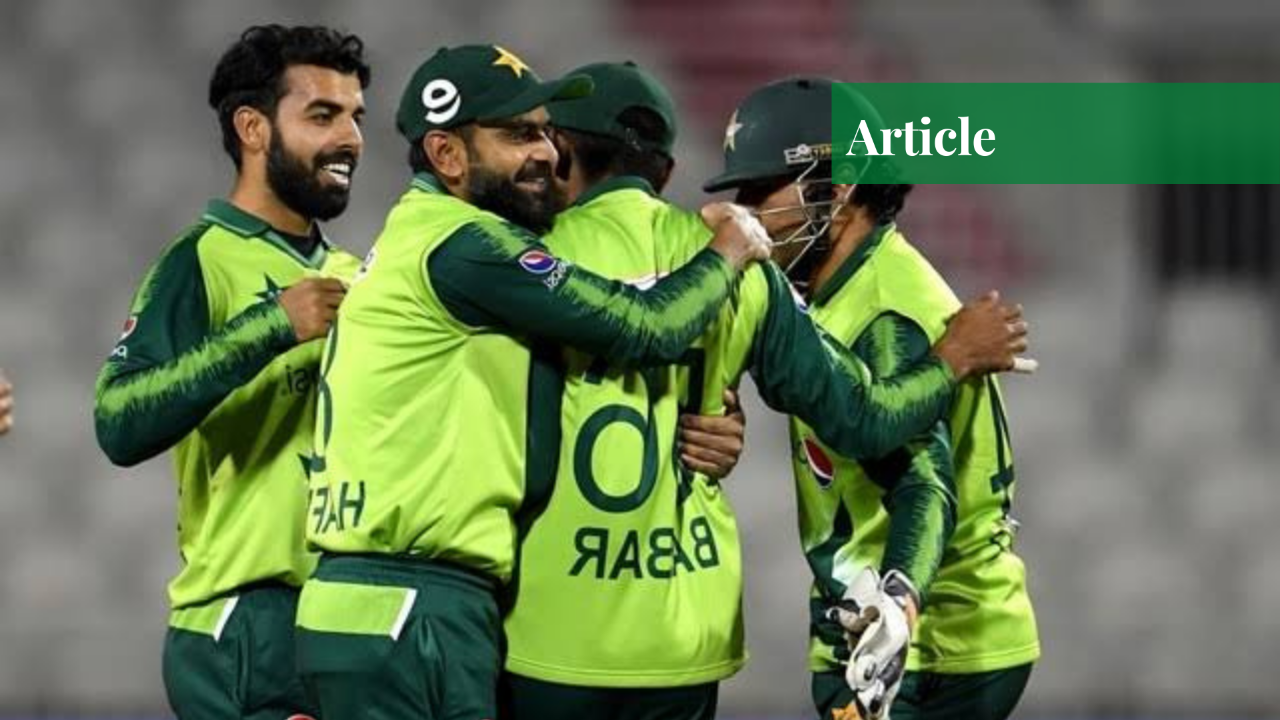Mr. Uzair Bin Farid completed his undergraduate degree from Quaid-e-Azam University before pursuing his Master's in Economics from IBA Karachi. He has a keen interest in IR, global politics, and strategic issues.
Love for All That Is Cricket
Pakistanis love only one sport: cricket. They do watch football, but football is not such a national sensation as cricket. Not only does Pakistan have a reputation for having a mercurial cricket team, capable of doing anything at any point of the game, they also have similar psychology required during cricket, especially the Test variant that is more suited to the part of the world where we live.
Strategic patience is the key. Learn to play the long game. Whatever be the philosophical and abstract underpinning of the gentlemen’s game, Pakistanis like to play it at their own pace. The 2017 ICC Champions Trophy against India where the Pakistan team pulled off a comprehensive win was a real success show.
Pakistan has been able to display some spectacular wins against India like that match of Asia Cup 2014 when Shahid Afridi smashed 2 sixes in the last over to Ashwin. This is not to say that India has never been able to win from Pakistan. India, too, has been able to put Pakistan in its place when it comes to cricket. India won against Pakistan comprehensively in the 2019 World Cup.
The history of sports will see its epitome when Pakistan and India face off against each other in an ODI World Cup if it ever comes. However, for the purposes of the present argument, it is not necessary to gather who wins or loses the most anticipated world cup. It is to shed light on an important development that happened only very recently.
Live Cricket Matches
Pakistan cricket team did a summer tour of England where it lost both ODI and T20 series. All the cricket-loving fans in both countries were waiting eagerly to watch the old colonial masters and their erstwhile subjects collide in a game of cricket. However, a month before the start of the series, the unfortunate news was broken to Pakistani fans by Fawad Chaudhry that live cricket would not be streamed for the Pakistani audience.
The reason for this is because Pakistan does not have any satellite licenses for broadcasts in South Asia. India holds all the licenses. When a suggestion was brought before the cabinet to approve a liaison between PTV and an Indian company to broadcast live matches, it was turned down; Pakistan will not engage India commercially unless India reverses its decision on Kashmir.
For a while, it seemed that Pakistanis would be deprived of their cricket delights, but then again, the commercial interests could not let go of an opportunity just like that. Somehow, an arrangement was reached. Whatever be the political reasons for this decision and its accompanying costs to PTV and PCB, it brings to the fore some very stark truths.
First and foremost that we have been dependent upon Indian whims for all time to watch our favorite TV channels. If India so desires, it can shut down all our favorite cable TV channels. It’s like they have a monopoly on what we can watch and not. It looks like the precursor of post-modern subversive tactics of Facebook and other social media websites.
Broadcasting Dependency
Switch on your TV and try to search for Al-Jazeera, the most independent and relatively unbiased media house of the 21st century, and when I say unbiased, I use the observations made by Robert Fisk in his work ”The Great War for Civilisation: Conquest of the Middle-East”. When I asked about Al-Jazeera, our cable operator was apologetic that we could not broadcast our own channels and had to rely on Indian rights.
Discovery is another channel that is missed by adventurous youth. It seems like ages since I last watched the frog-eating and scorpion-hunting Bear Grylls. On a deeper analysis, one realizes that for the past 20 years, or from when cable TV became vogue, we have been watching everything through an Indian lens. Star-movies, Star-plus, Star-sports, Nat-Geo, HBO with Indian ads, Animal Planet, Cartoon-Network, Peace TV, and who knows how many.
These channels were lavishly catering to the needs of the Pakistani audience. Media houses in Pakistan or the higher authorities in Pakistan Electronic Media Regulatory Authority (PEMRA) did not bother to dig deep and see if there was any better content available or even if they could get rights of broadcasting for their own country.
The rivalry between the two countries is not a state secret, but it must be asked why our armed forces try to keep up the competition with India and not other state institutions? Why can’t we compete with our Indian neighbors in the fields of science and technology? Why can’t we keep up with them academically? Why our broadcasting authorities were happy to rely on Indian channels?
Had they tried to secure rights for themselves, they might have been able to spur growth in channels that are not just limited to drama-serials like these, but we might have seen investments going in Urdu variants of channels like Discovery, Nat-Geo, and Animal Planet, etcetera. We could have watched Iranian cinema, Russian cinema, Turkish cinema, Egyptian cinema, French cinema, Italian cinema, Latin American, Far-Eastern, or even eastern European cinema.
Apart from helping create employment, it would have helped with the dilution of culture into a more cosmopolitan outlook with more consciousness of political activism among the masses. It would have created a median culture borrowing from influences from around the globe and not just from our Indian neighbors with whom we share a colloquial language.
It would have blurred the lines between Hollywood-watching and Bollywood-watching populace with a majority in the middle that would have watched everything. To end our dependency on Indian broadcast satellites, we will have to secure our own rights. It will take time, resources, and lobbying, and even court battles like those of basmati rice. Kashmir’s problem is not going to end soon and definitely not so easily.
This has made it clear that we, as a nation, have failed so far to not only solve the most daunting of our challenges but also that we have made little or no inroads into other realms of trivial entertainment. We have always relied on the mercy of other nations to do for us what we should have done for us ourselves.
Although the world has significantly moved beyond the cable TV era and soon TVs will become relics of the past, it does not hurt to learn lessons from mundane-color-TV days. The state needs to invest in futuristic technologies and work towards self-sufficiency so that we should not be dependent on Indian whims for our cricketing delights, not in a country whose premier was a former cricketing titan.
If you want to submit your articles and/or research papers, please check the Submissions page.
The views and opinions expressed in this article/paper are the author’s own and do not necessarily reflect the editorial position of Paradigm Shift



















